Revell 1/32 Spitfire MK 1, No. 54 Squadron, Pilot Officer “Al” Deere June 1940 B.O.B.
Here's a little article on the old (and I do mean old for a model) Spitfire Mk.1 that was initially released by Revell back in the year 1969 or so. This is a re- release of the kit from approximately 1990. It's kit number 4555.
I built it pretty much out of the box and I used the kit decals as well. I did decide to "box in" the wheel wells using sheet plastic.
This plane was flown by Pilot Officer Deere on occasion, and it served with 54 Squadron.
Pilot Officer Deere was from New Zealand. He scored a few kills in this plane over the Dunkirk evacuation in May, 1940. He shot down a Bf-109 "Emil" on May 24th, and a Bf-110 the next day. P.O. Deere was credited with seven kills, plus one damaged, one unconfirmed, and a shared kill during the Dunkirk evacuation. This was achieved in a matter of 5 days...
Later during the Battle of Britain, P.O. Deere was involved in a mid air collision over the Channel with a Bf-109E from JG 51 (flown by Oberfeldwebel Johann Illner), while flying this plane "KL B".
During a "head on" attack, neither pilot turned until the last split "millisecond". The model kit box art captures an artists rendition of this event. The 109 managed to limp home.
P.O. Deere crash landed near Manston. The collision with the 109 bent the propeller blades back on the Spitfire, disabling the Merlin. In addition to this, the canopy was damaged, and much of the fin and rudder assembly were torn away. P.O. Deere was able to glide his Spit back to the relative safety of dry land...
There is an excellent article about this Hero on Wikipedia.
The plane was then repaired to flight status, but sadly was later lost with P.O. A. Evershed at the controls.
Pilot Officer Evershed was killed. Recently the remains of this historic aircraft have been recovered. The plane is now scheduled for restoration.
I built this model as a tribute to "The Few".
I built this one before I found out that some Spitfires had reddish colored Bakelite seats. When this model was built I didn't know about the "A" schemes or that the "B" scheme was just the opposite simply by reversing the colors. My "Spit" has a soft edge camouflage pattern, where it should be a fairly hard edge. I'm pretty sure that they used rubber masks in similar fashion that our "Curtiss" P-40's were painted that were destined for use with the RAF. This plane was apparently delivered with the "Black and white" undersurfaces on the wings, and a silver colored under fuselage and stabilizer / elevator area. But this "may" have been sprayed in "Sky" sometime during June of 1940...
I'm sure there are numerous other errors, but I don't profess to be a Spitfire "Guru"... One of the most obvious errors is the "Kiwi" bird decal placement. from what I can tell now is that this bird may have been on both sides of the fuselage. I simply followed the kit instructions blindly... In the end it looks like a Spitfire to me.
There was some flash to contend with on the parts. This is to be expected considering the age of the molds. This model also has separate control surfaces. In hindsight I would have washed the cockpit to bring out the details and positioned the control surfaces differently. There isn't any weathering on this model either. Someday I may go back and revisit that part...
This model was finished using Model Master enamels. The colors I chose were ANA 617 "Dark Earth", ANA 610 Sky Type "S", and RAF Dark Green. I sprayed the plane using an Aztek air brush. The kit decals went down rather nicely. Once everything was finished, I gave the plane a coat of "Dull Coat" from a rattle can.
As always comments are encouraged...
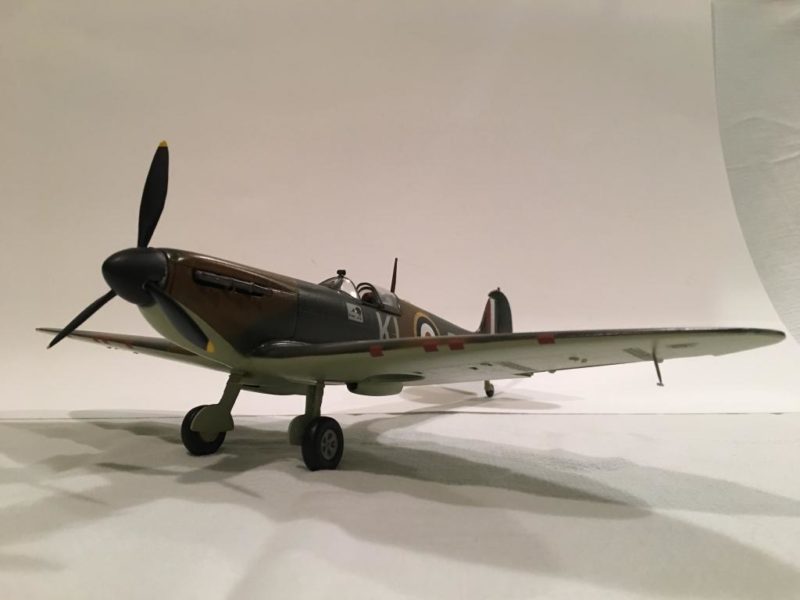
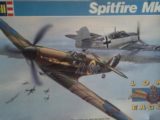
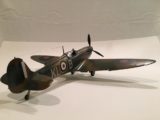
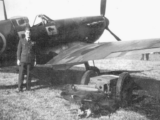
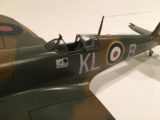
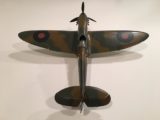
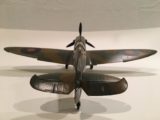
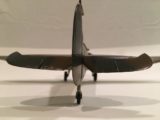
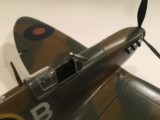
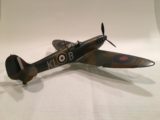
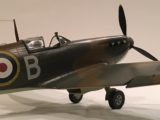
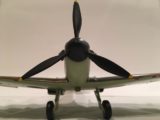
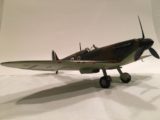
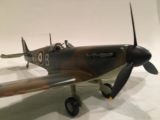
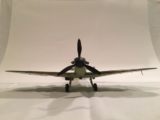
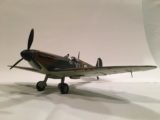
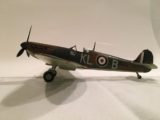
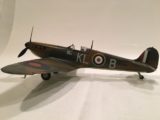
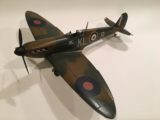
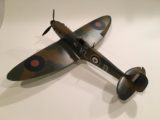
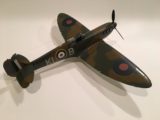
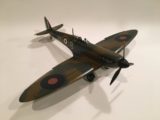
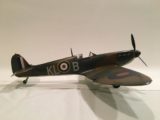
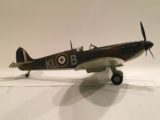
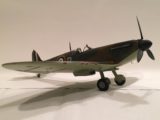
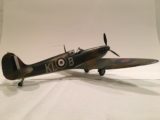
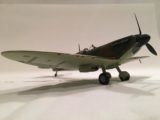
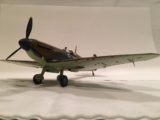
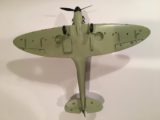

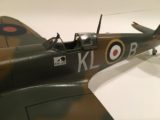
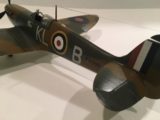
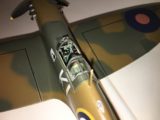
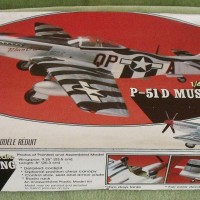
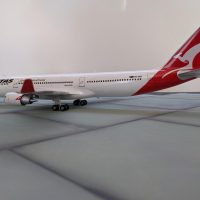
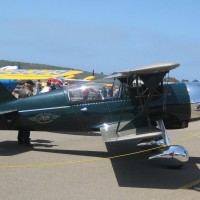
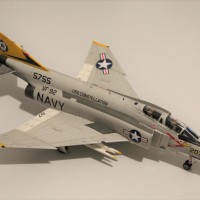
Well...however 'old' it is, it still looks good from where I'm sittin', Louis. 🙂
Thanks Craig ! I'm a little biased but I agree... The Spitfire simply looks good to me. It has to be one of the most elegant planes of all time.
Louis, she looks good to me. One of the initial 3 32nds Revell released, the other 2 being the P-40E in Flying Tiger marking, and an ME-109F (later turned into a G). Spitfires are just pretty.
Thanks Bernard. I remember those kits. In fact that P-40 E "Flying Tigers" was the first kit I ever built. I had the 109 too but mine was the Gustav. This model in the article was my first 1/32 Spitfire. I agree it's a beautiful plane from every angle.
Possibly the most elegant pair of wings ever engineered. Like the colours.
Reginald Mitchell did a wonderful job with this one. Thanks for the compliments.
Good job on this old kit, Louis, With some care and skill still a good looking build, as depicted.
Thanks Bernd. I took my time with it for sure. It had some flash on the parts to contend with. I think that is why it ended up fitting together halfway decent. I spent the extra time fitting the parts together. I like how it turned out. I may eventually go back and weather it some. Thanks again my friend.
Louis, your Spitty is nice as it is now. From time time i put out an older build and change something. Feels often like almost new !
So why not ?
Maybe some of the details are incorrect, but, like you say, it looks like a Spitfire!
I agree sir. I guess that's why they say " ignorance is bliss ". I now there are some things wrong with the old girl but it looks like a Spit to me too. I'm not one to be a "rivet counter". Thanks again.
Sorry that should have said "know there are some things "...
Nice Spit!
Thanks Greg.
Nicely done, Louis. Sounds like you had fun doing it and that is the most important part. Cheers!
Yes Sir, it was a fun build. I agree with you on that being the most important part.
Thanks for the compliments !
Luis,
Except the two pilot you mentioned in your nice historical note, you are the third hero, deciding to build such an old kit. Nice job.
Roberto.
Thanks for the compliments Roberto, but I'm not a hero. I have looked at some of your articles here on Imodeler and you build some very impressive models. Thanks again my friend.
Your 1/72 Tamiya Corsair is amazing !
Definitely looks like a Spit. and beautiful one at that.
Thank you Robert. It does have nice lines to it.
nice work Louis - looks good !
Thanks David. I appreciate the compliment.